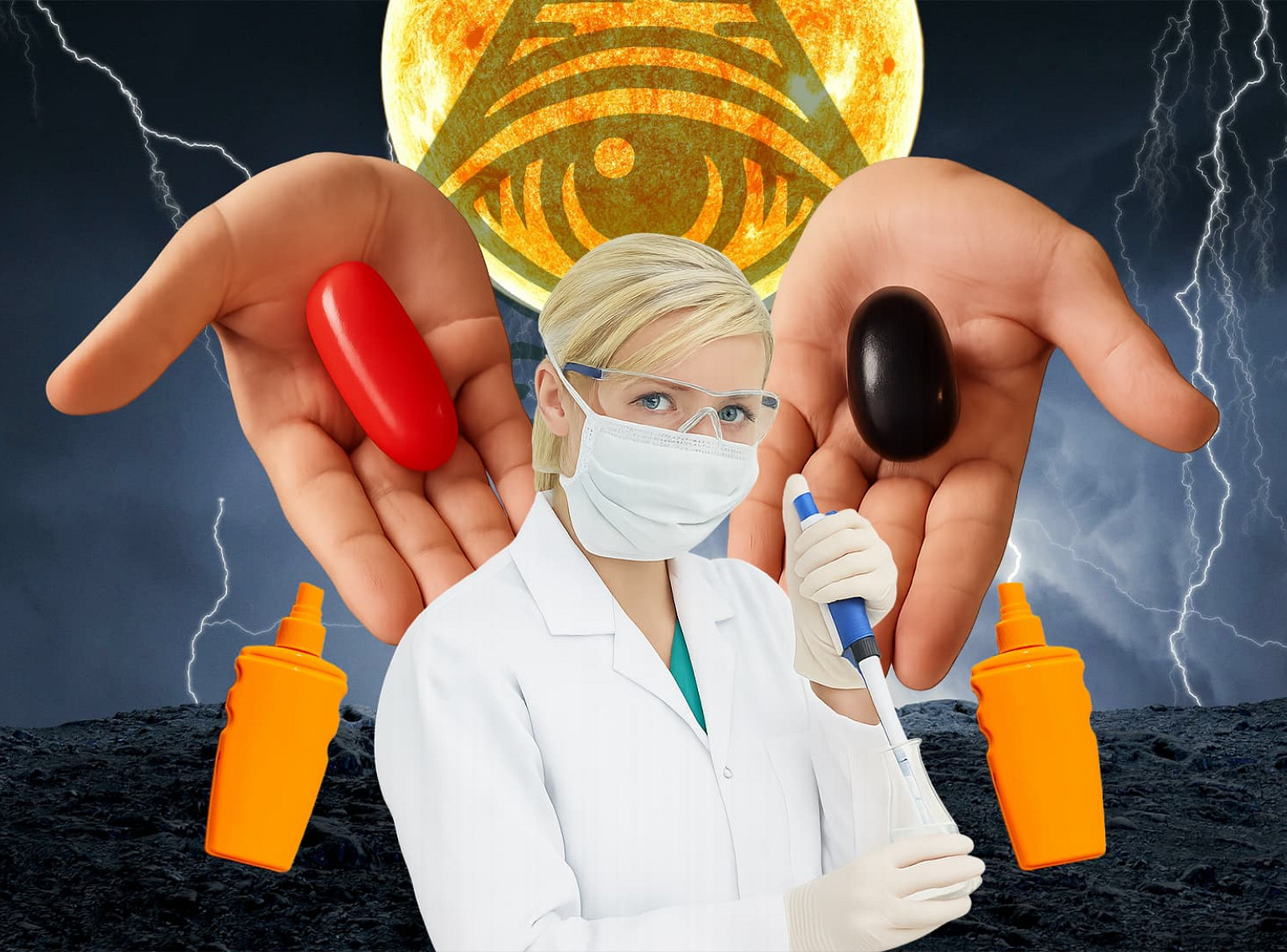“Big Sunscreen”: How Misinformation Fuels Extremist Conspiracy Theories

For over a decade, a broad range of “sunscreen truthers” on platforms such as TikTok, Instagram, and Facebook have propagated the belief that sunscreen causes cancer. Since the pandemic, these conspiracy theories have intensified across social media, embraced by groups from vegan anti-vaxxers and bro-biohackers to MAHA and QAnon followers. Despite their differences, they share two core traits: a fear of chemicals (chemophobia) and the conviction that sunscreen is harmful.
The Extremist Conspiracy Network
Beneath mainstream social media lies a darker realm of extremist platforms with minimal oversight—like Trump’s Truth Social, known for amplifying conspiracies, and 4Chan, infamous as a hub for hate and violence. Here, far-right and far-left factions merge in what researchers call a “diagonalist” intersection, united by the belief that all power is rooted in conspiracy, including sinister anti-sunscreen narratives.
According to a 2024 Orlando Health Cancer Institute survey, one in seven young adults under 35 believes sunscreen is more dangerous than the sun. Meanwhile, studies attribute the surge in skin cancer diagnoses over the past 30 years largely to increased sun exposure, excessive tanning, and indoor tanning practices.
Dr. Neil Johnson, a physics professor at George Washington University who studies misinformation, explains that extremist social media platforms are breeding grounds for conspiracy theories like the anti-sunscreen movement because they largely evade regulatory scrutiny. These platforms connect around 50 million users directly to the mainstream social media communities of over 5 billion people worldwide.
Layers of Misinformation
Platforms like TikTok, Facebook, and Instagram serve as the outer layer where wellness influencers and “clean” beauty brands spread alarming misinformation about sunscreen. One step deeper, on X (formerly Twitter), mainstream sunscreen myths intermingle with extremist posts linked to QAnon. The rhetoric darkens further on extremist platforms such as Truth Social and 4Chan, where fear and hate messages dominate, blaming governments, Big Pharma, and even Jewish people.
An Unexpected Figure in the Narrative
Spring and early summer see spikes in sunscreen conspiracy theories across both mainstream and extremist channels. Notably, one viral post by MatrixMysteries, a QAnon-aligned Illuminati believer, claims “Sunlight Causes Cancer—A Fear-Driven Lie.” This post has amassed over 1.4 million views on X and spread to extremist sites like Truth Social.
Among the images shared is a photo of Dr. Barbara Sturm, a luxury skincare brand founder. In an interview with biohacker podcaster Gary Brecka—who promotes controversial health ideas and supports RFK Jr.’s MAHA movement—Dr. Sturm suggests that strengthening skin internally might reduce the need for sunscreen, a claim surrounded by misinformation.
This interview typifies the “clean” beauty founders’ approach: emphasizing which ingredients they exclude rather than the benefits their products provide, often combined with fear-based messaging. The association of “clean beauty” rhetoric with far-right conspiracies demonstrates how such narratives can open doors to more dangerous extremist ideas.
Marketing Fear in “Clean” Beauty
Timothy Caulfield, a law and public health professor, notes that fearmongering has become a powerful marketing tool in the clean beauty industry, especially post-pandemic. Brands make broad claims everyone supports—such as desiring safe products—then retreat behind those claims when challenged, framing critics as enemies and labeling them “pro-toxins.” This tactic, known as the motte-and-bailey fallacy, distracts from scientific scrutiny and fuels misinformation.
Antisemitism and Toxic Extremism
On extremist forums like 4Chan, antisemitic anti-sunscreen conspiracies circulate, portraying sunscreen as a “Jewish lie” or “trick.” Researcher Beth Daviess found that some wellness influencers adhere to Germanic New Medicine, an antisemitic alternative health belief system. Followers claim sunscreen is part of a Jewish conspiracy aimed at undermining whiteness.
Daviess explains that while not all anti-sunscreen advocates are antisemitic extremists, conspiracy thinking often leads down that path. The deeply ingrained societal narrative of a powerful controlling force frequently points to Jewish people as the culprits, a recurring theme across many conspiracy theories.
Lookmax.org, a men’s community site, hosts many angry incels who spread Jewish hate and blame sunscreen labels for promoting continued use to increase product sales. Some incels also claim sunscreen reduces masculinity and attractiveness, viewing its use as incompatible with “real” manhood. Research debunks this myth, showing sunscreen is a critical protective measure against skin cancer.
The Tireless Fight Against Misinformation
Dr. Michelle Wong, an Australian chemist and science communicator behind Lab Muffin Beauty Science, dedicates over 700 hours annually to combating anti-sunscreen misinformation on social media. She patiently addresses panicked followers and critics alike, despite being accused of promoting “Big Pharma” interests.
Dr. Wong is particularly concerned about parents who refuse sunscreen for their children due to conspiracy fears. Data shows sunburns before age 18 significantly increase melanoma risk because immature stem cells are more vulnerable to damage.
Studies reveal that teens with five or more blistering sunburns between ages 15 and 20 face an 80% higher melanoma risk and a substantially increased chance of other skin cancers.
The Impact of Misinformation
Professor Caulfield warns that the ongoing misinformation creates polarized views, overshadowing nuanced understanding and leading people to focus on the wrong issues. Dr. Wong’s calm, evidence-based responses to social media comments help slow the spread of falsehoods, but fear-inducing headlines continue to cause setbacks.
One common skeptical comment she encounters is: “Our skin is the largest organ; why douse it in chemicals? When did humanity go from worshiping the sun to demonizing it?” Dr. Wong replies with facts and statistics, striving to keep public trust in sun protection alive despite the relentless tide of misinformation.



